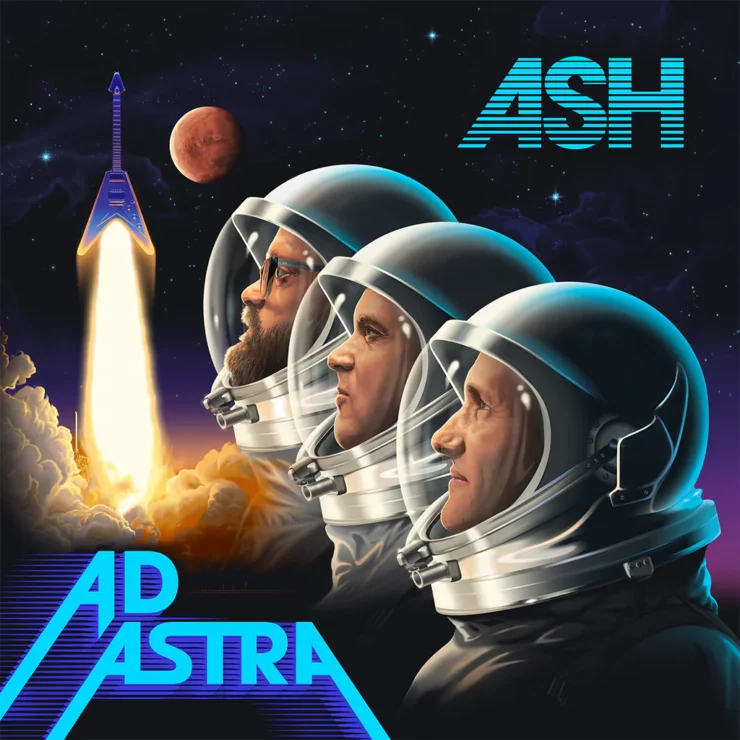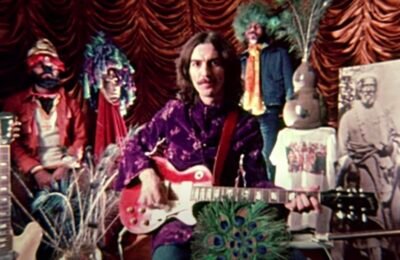It’s easy to forget just how long ASH have been around — and how effortlessly they’ve kept doing what they do best. The Northern Irish trio may never have chased reinvention or grand statements, but that’s precisely their charm. Nearly thirty years after 1977 turned them into teenage rock heroes, ASH return with Ad Astra, a record that reminds us why they’ve endured: bright, tightly written songs that balance melody, muscle, and just the right amount of mischief.
A Band That Never Lost Its Spark
From their Britpop-era breakthrough —label they contest, coming from Ireland— to their steady evolution into elder statesmen of power pop, ASH have built a career on consistency rather than hype. They’ve weathered lineup changes, label shifts, and changing trends — but their sense of fun has always stayed intact. They take the music seriously, never themselves, and Ad Astra sounds like the work of a band perfectly at ease with that balance.
To the Stars, and Back Again
The album has a very specific thematic around space, with a cover inspired by the 2019 movie with the same name. The references to space don’t restrict themselves to the cover though. The opener is none other than a power pop take on cult Kubrick’s movie 2001: Space Odyssey opening scene’s theme: “Also Sprach Zarathustra” —imagine Humanity discovering Ad Astra instead of the monolith… “Dehumanised” lifts off at the end sounding like a rocket, and many lyrics around the refer to space. The video clip for “Give me back my world” also features our grown up trio dressed up as astronauts and fight with light sabres…
Coming from ASH this doesn’t really comes as a surprise. Their debut album’s title alone is a reference to the year Star Wars was created. As for their debut single, well just remember its title: “Jack Names the Planets“. ASH is also know for trying to produce a short slasher movie in 2003 —featuring Coldplay’s Chris Martin and Johnny Buckland, as well as Dave Grohl or Moby… Although the movie never saw the light of day, part of it was released as a music video for “Binary” in 2010, featuring another reference to Star Wars from the first screen stating in blue letters « Not long ago in a place not far away… »
The Sound of Ad Astra
Their ninth effort lives in a kind of timeless bubble — somewhere between ’80s power pop, ’90s alt-rock, and college-radio nostalgia. Musically, Ad Astra doesn’t aim for cohesion, which at first might be a bit confusing. But after a couple listen, once we get with Ash’s program —not taking themselves too seriously— it all comes together.
The opening “Zarathustra” sets the tone, taking Kubrick’s iconic 2001 theme and turning it into a punchy, guitar-driven salute to space rock. It is a bit surprising at first —and maybe pompous— but it works really well as an opening for this space-themed album… From there, “Which One Do You Want?” nods to The Smiths with its jangly melancholy. Wheeler has that in common with Morrissey: his voice doesn’t age, or if it does, it matures like a fine wine — smooth, expressive, and instantly recognisable.
The Coxon chemistry
The album then bursts into “Fun People,” the first of two tracks featuring Graham Coxon —from Blur of course. It’s exactly what its title promises — a fizzy, inventive slice of power-pop… It’s a fun, head-bobbing, real jumpy kind of piece. Coxon’s guitar adds propulsion to one of the band’s most infectious choruses in years… The collaboration continues on the closing title track, “Ad Astra,” where Coxon’s fuzzy, sputtering soloing is bringing the album to a climaxing ending. The chemistry of this collaboration is giving us two definite highlights of the album.
Standout moments
Other standouts abound. “Hallion” is an instant anthem, all soaring choruses and nineties punch, the kind of song that begs to be shouted back at a festival stage. “Dehumanised” adds a heavier edge, dipping into grunge with a guitar solo that could almost pass for Queen in full flight. “Ghosting” follows closely — a bouncy power-pop gem tackling modern social habits with humour and bite.
Then come the surprises. “Jump In Line,” a punky, high-voltage cover of the Harry Belafonte classic, is the record’s big “WTF?” moment — absurd, unexpected, but ultimately irresistible once it kicks in. “Keep Dreaming” shifts gears again with its synth-pop shimmer; it feels long on first listen but reveals new warmth and charm over time, growing into one of the album’s quiet standouts.
Final Thoughts
In the end, Ad Astra might feel confusing on first listen — a bit all over the place — but it grows into focus. Once it does, it makes perfect sense. It’s exuberant, melodic, and self-aware, a reminder that ASH’s best work happens when they follow their instincts and refuse to take the game too seriously. Three decades in, they still sound like they’re having a blast — and it’s impossible not to get caught up in their orbit.


















